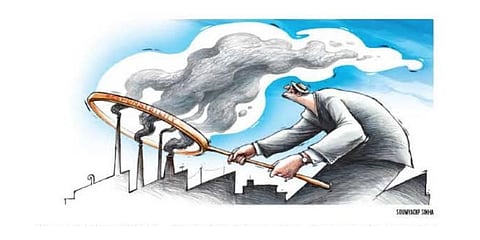

With nations worldwide realising the gravity of the climate crisis and pledging to take sincere actions for sustainable development so as to not further endanger the Earth in COP26, ‘responsible management’ has become the popular buzzword. In simple words, it means running industries in a manner that does not endanger the Earth by adding to the climate crisis.
Countries have come to this realisation after witnessing many cyclones, floods, forest fires, and the Covid-19 pandemic. It has also dawned on leaders that unless wealth creators change their manufacturing process and make it more eco-friendly, and society opts for cleaner energy and a sustainable way of living, we cannot stop endangering the Earth. Too much time has already been lost.
Everyone knows global warming has happened and will continue to happen because of the way humans have destroyed nature and are following a materialistic philosophy that proclaims that the more we consume, the happier we will become. Most people in first world nations believe that the more luxuries they have, the happier they will get.
Eastern philosophy, on the other hand, teaches human beings to be satisfied with just what is needed to live and lead a life of austerity, detachment and renunciation, which leads to happiness and peace. I am not getting into what is right and wrong or how much of which type of philosophy is right. If people do not aspire at all, development will stop. We don’t want to regress to the stone age. But if consumerism is overdone, it will lead to the destruction of the Earth, global warming and unsustainable development.
What does responsible management for modern businesses and society look like? Mainstream management practices have been blamed for many of the world’s current ailments, including the universally important issues of social injustice and environmental destruction. However, it was never envisaged that industries should create wealth in a manner that endangers the earth or society, or make people lose their work-life balance.
Peter Drucker, considered the greatest proponent of management theory, sees responsibility for the social impact of one’s activities as a natural core element of good management that does not need to be specifically mentioned. Paraphrasing Drucker’s words, managers must achieve positive social impact as one of their basic responsibilities to their organisations, actively detecting social needs and turning them into business opportunities. J R D Tata always said, “The purpose of running an industry is to create wealth for the nation and make profits in a responsible way, by not endangering human beings or nature. The test of success is excellence and perfection in products and services.”
C K Prahalad spoke about “inclusive capitalism”, which directs industries to grow while involving the community and the poor surrounding them so that both of them can grow, each happier for the other.
When we think of management of change we have to think of three main domains of sustainability: responsibility, ethics, and generating stakeholder value without endangering the Earth. Sustainability management activity must lead to a sound, positive triple bottom line that protects, creates and sustains social, environmental and economic business value. Ethical decisions in management must be morally desirable in both the process and outcome. Management practice must embrace ethical decision-making and create moral excellence.
This integrative model for responsible management can be seen as the highest level in the evolution of responsible business thinking, since it incorporates the three background domains of sustainability, responsibility and ethics as distinct and equally important bases. The model is in line with recent developments in theory and practice in which responsible business is seen as being strongly influenced by all three domains. From a sustainability standpoint, resources are understood as the three types of capital—social, environmental and economic—that need to be sustained or even regenerated in the management process. Responsible management abstains from seeing resources as a mere means of creating shareholder wealth.
In 2009, senior management thinker Gary Hamel brought together a group of 35 eminent management specialists, including C-level managers from Google, UBS and McKinsey as well as other CEOs and theorists, such as Henry Mintzberg and Peter Senge. This eminent team of ‘renegades’, as they called themselves, jointly developed 25 recommendations for management of the future. The consensus was that management has to take the next evolutionary step. Interestingly, their first three recommendations all related to ethics, sustainability and responsibility:
1. Ensure that the work of management serves a higher purpose. Management, both in theory and in practice, must orient itself to the achievement of noble, socially significant goals.
2. Fully embed the ideas of community and citizenship in management systems. There is a need for processes and practices that reflect the interdependence of all stakeholder groups.
3.Reconstruct management’s philosophical foundations. To build organisations that are more than merely efficient, we need to draw lessons from such fields as biology, political science, and theology.
Responsible management is all about growing and becoming successful without compromising on ethics, community development and safety of the earth.
Ashoke K Maitra
Founder, Sri Ramakrishna International Institute of Management
(ashoke.maitra@gmail.com)